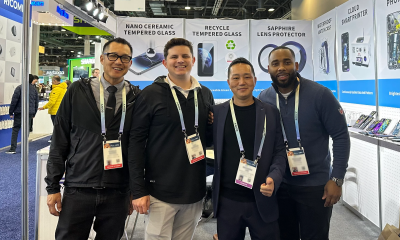Finance
Meet IAA, a second chance wealth management firm


Ed
Cofrancesco, the president of International Assets
Advisory.
IAA
-
A Florida wealth-management firm that oversees $500
million hires brokers who’ve had run-ins with the law or
regulators. -
Some of the brokers reported minor infractions, such as
shoplifting as a teenager, while others faced enforcement
actions from groups like the Financial Industry Regulatory
Authority. -
The midsize firm’s strategy — which industry
headhunters say is unique — helps it broaden the talent pool,
according to its founder.
One would-be broker stole two hot dogs while drunk in college.
Another was fined and fired when his firm created and forced him
to sell bad products to individual investors. And another racked
up a dozen incidents with a financial regulatory group and nearly
let his license expire but couldn’t see what he did wrong.
All had black marks on their public records.
Who deserves a second chance?
Ed Cofrancesco, the president of International Assets Advisory, a
wealth-management firm in Orlando, Florida, said his company
hired the first two brokers but nixed the third.
For those who receive a second chance from the firm’s founder,
any third strike sees them thrown out.
IAA, which oversees about $500 million in client money, takes an
unusual approach to recruiting. The firm proudly hires some
brokers considered unemployable at other firms because of past
offenses, ranging from misdemeanors in college to misconduct as a
professional.
Headhunters say this approach won’t work for most firms because
of the potential for reputational risk and the heightened level
of internal supervision involved. But Cofrancesco insists the
strategy has allowed him to tap a wider pool of talent. It’s also
the right thing to do, he said.
“I believe in second chances and that there are two sides to
every story,” he said. “Giving second chances is part of being an
American and a Christian.
Of IAA’s 150 financial advisers, 36% must check “yes” on one part
of a registration
form from the Financial Industry Regulatory Authority, an
industry-funded brokerage regulator, that would automatically
disqualify them from even being considered for a job at most
firms.
The disclosure questions, on three pages, ask applicants whether
they’ve been charged with a felony or a variety of misdemeanors.
Applicants must also detail any run-ins with regulators such as
the Securities and Exchange Commission.
Most employers automatically screen applicants who answer “yes”
to any of the 57 questions on FINRA’s disclosure form, according
to headhunters. IAA, on the other hand, will consider those
brokers through a process that Danny Sarch, the founder of
Leitner Sarch Consultants, a recruiting firm in White Plains, New
York, and other recruiters said they had not seen elsewhere.
“A few years ago, people weren’t as absolute about it,” Sarch
said, adding that “now there are certain firms that just won’t
hire” any brokers with those disclosures. Often, blue-chip firms
want to avoid the reputational risk that comes with hiring such
professionals.
A
2016 study by researchers from the University of Chicago and
the University of Minnesota found that about 7% of all US
advisers had a misconduct record. At top firms like Goldman Sachs
and Morgan Stanley, that percentage fell to less than 1%.
Sarch said that when brokers with checkered pasts ask him for
advice, “I tell them it’s a tough road and big firms want little
to do with them because of it.”
But he said IAA’s approach was the first he’d heard of a firm
“with a defined strategy” for hiring brokers with past misconduct
“and the care in who they hire.”
“It’s definitely out of the ordinary,” he said, “and it’s got its
share of risk.”
The researchers found reason for caution for firms considering an
approach like IAA’s: Past offenders were about five times as
likely to engage in misconduct than the average adviser.
‘Stealing a hot dog when you’re 18 and drunk’
Cofrancesco grew up in Brooklyn and was drawn to Wall Street by
his father, who worked as a chef in JPMorgan’s private dining
room. He started in the finance world as a teenager, working as
an assistant trader in the equity-trading department at Shearson
Hayden Stone while attending night school.
Cofrancesco eventually worked his way up to vice president at the
investment firms Lehman Brothers and Raymond James, then became
the chief operating officer at International Assets Holding
Corporation, which spun off IAA. Cofrancesco left the company,
then returned to IAA in late 2005 before buying the firm in
December 2006.
Cofrancesco now stays out of IAA’s hiring process, which is run
by a four-person committee. The firm’s chief business development
officer, Ann Moore, screens candidates with any issues initially
before passing her picks onto the committee, which consists of
Moore, the general counsel, the chief compliance officer, and the
chief operating officer.
The committee examines background checks, credit checks, external
business activities, and even Google search results to parse who
deserves a second chance. If those processes turn up questionable
results, the hiring committee will investigate. A low credit
score could stem from imprudent spending on expensive cars and
vacations — or a sick family member who saddled the candidate
with medical bills.

Myra Nicholson, IAA’s
general counsel.
IAA
Three of the four committee members must approve a candidate,
though the general counsel, Myra Nicholson, said the vote was
typically unanimous.
Because FINRA’s disclosure questions cover a variety of offenses,
Nicholson said, she’s seen “pretty much anything.”
In one example, her committee looked at a candidate whose history
might be disqualifying for other firms. Years ago, the person was
browsing at a store with a friend who shoplifted. Both were
charged with a misdemeanor — an automatic “yes” to FINRA’s
disclosure question in 14B, which asks about “wrongful taking of
property.”
“From the outside looking in, it doesn’t matter what that ‘yes’
answer is,” Nicholson said. “A ‘yes’ for stealing a hot dog when
you’re 18 and drunk is the same ‘yes’ answer as stealing money
from your clients.”
Read more:
Adviser’s serial firings show ‘big problem’ at
brokerages
Even multiple “yes” answers may not indicate a candidate too
problematic to hire. One initial problem — selling a product
FINRA deems unsuitable for clients, for example — can compound.
FINRA may suspend and fine the broker, then the state could
investigate too, perhaps putting the broker on heightened
supervision. IAA’s hiring committee examines both the root cause
and the consequences.
“The fact that someone has four yeses doesn’t necessarily mean
that they shouldn’t be looked at,” Nicholson said. “We always ask
for an explanation from the rep as to what occurred. Sometimes we
get an explanation and we look at each other and say, ‘That
doesn’t add up — there’s something they’re not telling us.'”
The advisers who make it through the hiring committee’s screens
are typically subject to on-the-job auditing. Depending on the
employee’s history, the firm may restrict a broker’s type of
business and employ additional monitoring.
Through the process, “we get a lot of good reps who nobody else
would look at,” she said.
‘Zero-tolerance policy’
For those who are hired, Cofrancesco is clear that there no third
chances. About 90% of the time, the brokers are employed without
further issue, he said.
In some cases, employees lied about their backgrounds — even
doctored evidence — and were terminated when bad behavior at
previous firms came to light. One employee had past issues with
improper use of emails, including deleting messages, and when
they did the same at IAA, they were fired.
“If we give people a second chance, we have to have a
zero-tolerance policy,” Cofrancesco said.
IAA also keeps an open dialogue about its hiring strategy with
FINRA, asking about best practices and what other firms are
doing. IAA has had seven disclosure events — which detail
criminal issues, regulatory actions, and other financial matters
— with the regulator, though none since 2000.
“We consistently hear that we’re doing substantially more
[supervision] than most other firms,” Nicholson said.
A spokesman for FINRA said the organization did not comment on
firms’ business practices.
The issue of hiring brokers with past misconduct is far from new
— FINRA’s predecessor and other industry groups published
guidance in the 1990s.
More recently, FINRA drew political scrutiny after the 2016 study
on broker misconduct. That year, Sens. Elizabeth Warren and Tom
Cotton
wrote to FINRA’s CEO to ask what specific steps the
organization would take to address “the pervasive misconduct”
among financial advisers.
FINRA has since said it would focus on firms’ hiring and
supervisory practices for high-risk brokers. In April, it
published further guidance for firms implementing supervisory
practices for employees with a history of misconduct.
“That tells you it’s still a top, top priority,” said Susan
Light, a former FINRA general counsel who is now a lawyer at
Katten Muchin Rosenman.
Light said the regulatory groups understood that in some cases,
past misconduct should not bar brokers from employment.
She recalled a conference call with regulators who examined the
history of a broker who had a kidnapping conviction on his
record, a felony that automatically disqualified him from
registration. But the industry groups discovered that, as an
18-year-old, the man threw his friend’s car keys into an ocean.
Upset and stranded, the friend called the police and had the man
arrested on kidnapping charges.
The groups decided to grant the broker an exemption.
Light said any firm looking to imitate IAA’s hiring strategy
needed to ensure that supervisory procedures are written down —
and followed.
“When you hire a person with a disciplinary problem and you know
that,” she said, “you own that problem.”
-

 Business6 days ago
Business6 days agoLangdock raises $3M with General Catalyst to help businesses avoid vendor lock-in with LLMs
-

 Entertainment6 days ago
Entertainment6 days agoWhat Robert Durst did: Everything to know ahead of ‘The Jinx: Part 2’
-

 Entertainment5 days ago
Entertainment5 days agoThis nova is on the verge of exploding. You could see it any day now.
-

 Business5 days ago
Business5 days agoIndia’s election overshadowed by the rise of online misinformation
-

 Business5 days ago
Business5 days agoThis camera trades pictures for AI poetry
-

 Business6 days ago
Business6 days agoCesiumAstro claims former exec spilled trade secrets to upstart competitor AnySignal
-

 Entertainment7 days ago
Entertainment7 days agoDating culture has become selfish. How do we fix it?
-

 Business7 days ago
Business7 days agoScreen Skinz raises $1.5 million seed to create custom screen protectors






















